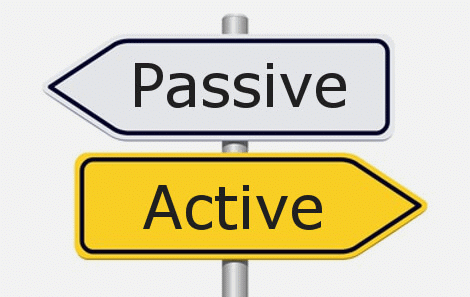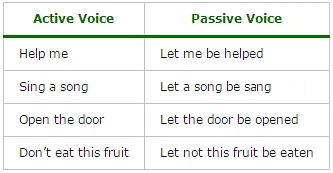Rules & Examples: Change of Voice | SSC CGL Tier 2 - Study Material, Online Tests, Previous Year PDF Download
| Table of contents |

|
| What is the Voice of a Verb? |

|
| Types of Voices of Verb |

|
| Rules for Active-Passive Voice Conversions |

|
| Forms of Active And Passive Voice For All Tenses |

|
| Synopsis |

|
What is the Voice of a Verb?
- The voice of a verb expresses whether the subject in the sentence has performed or received the action.
- Examples: (i) The watchman opens the door.
(ii) The door is opened by the watchman.
Types of Voices of Verb

Verbs have two voices:
- Active Voice
- Passive Voice
1. Active Voice
- When an action performed by the subject is expressed by the verb, it is an active voice.
- Active voice is used when more straightforward relation and clarity is required between the subject and the verb.
- Examples: (i) Hens lay eggs.
(ii) Birds build nests.
2. Passive Voice
- When the action expressed by the verb is received by the subject, it is passive voice.
- Passive voice is used when the doer of the action is not known and the focus of the sentence is on the action and not the subject.
- Examples: (i) Eggs are laid by hens.
(ii) Nests are built by birds.
Rules for Active-Passive Voice Conversions
Below are the active-passive voice rules to follow for changing an active sentence into a passive voice. Before heading to the rules of active-passive voice, let’s check the examples of active and passive voice sentences.
Example 1:
Active: Rita wrote a letter. (Subject + Verb + Object)
Passive: A letter was written by Rita. (Object) + (auxiliary verb) + (past participle) + (by subject).
Example 2:
Active: She cooks food. (Subject + Verb + Object)
Passive: Food is cooked by her. (Object) + (auxiliary verb) + (past participle) + (by subject)
He is writing the book.
Rules for Active-Passive voice conversions are:
Rule 1: Identify the (S+V+O) Subject, Verb and object in the active sentence to convert to passive voice
Example: He drives a car. (Subject – He, verb – Drives, object – Car)
Rule 2: Interchange the object and subject with each other, i.e. object of the active sentence become the subject of the passive sentence.
Example: Active Voice: She knits a sweater. (Subject – She, Verb – Knits, Object – Sweater)
Passive Voice: A sweater is knitted by her. (Object sweater is interchanged with the subject She).
Rule 3: In passive voice sometimes the subject is not used, i.e. the subject in passive voice can be omitted if the sentence without it gives enough meaning.
Example: Milk is sold in litres.
Rule 4: Change the base verb in the active sentence into the past participle ie. third form verb in a passive sentence i.e. preceded by (By, With, to, etc). Base verbs are never used in passive voice sentences.
Example: (i) Active Voice: She prepares dinner.
Passive Voice: The dinner is prepared by her.
(ii) Active voice: She knows him.
Passive voice: He is known to her.
(iii) Active voice: Juice fills the jar.
Passive voice: The jar is filled with juice.
Rule 5: While conversion of Active voice sentence to Passive voice sentence, the pronoun used in the sentence also changes in the following manner.
Active Voice Pronoun | Passive Voice Pronoun |
I | Me |
We | Us |
He | Him |
She | Her |
They | Them |
You | You |
It | It |
Rule 6: Use the suitable helping or auxiliary verb (is/am/are/was, etc.). The rules for using auxiliary verbs in passive voice sentences are different for each tense.
Examples: (i) The letter is written by her
(ii) A book was not bought by her
(iii) Chocolates are being eaten by them.
Forms of Active And Passive Voice For All Tenses
1. Simple Present Tense
Active Sentences | Passive Sentences |
He writes an essay | An essay is written by him |
Sheena does the housework | The housework is done by Sheena |
She cares for the rabbit | The rabbit is being cared for by her |
Jacob always plays the guitar | The guitar is always played by Jacob |
2. Present Continuous Tense
Active Sentences | Passive Sentences |
They are eating bananas | The bananas are being eaten by them |
Bob is drawing a diagram | A diagram is being drawn by Bob |
Samta is playing the piano | A piano is being played by Samta |
She is waiting for Reema | Reema is being waited for by her |
3. Present Perfect Tense
Active Sentences | Passive Sentences |
Has he done the work? | Has the work been done by him? |
Have they left the apartment? | Has the apartment been left by them? |
He created this masterpiece | This masterpiece is created by him |
He read the newspaper | The newspaper is being read by him |
Note- [except certain exemptions, no passive Voice formation for the following tenses can be formed, Present Perfect Continuous Tense, Past Perfect Continuous Tense, Future Perfect Continuous Tense and Future Continuous Tense]
4. Simple Past Tense
Active Voice | Passive Voice |
Ria paid the bills | The bills were paid by Ria |
The teacher called the student | The student was called by the teacher |
She did not buy the fruits | The fruits were not bought by her |
5. Past Progressive/Continuous Tense
Active Voice | Passive Voice |
They were waiting for him | He was being waited for by them |
Astha was learning French | French was being learnt by Astha |
She was playing kabaddi | Kabaddi was being played by her |
6. Past Perfect Tense
Active Voice | Passive Voice |
She won the match | The match had been won by her |
I had finished her work | Her work had been finished by me |
He had missed the last metro | The last metro had been missed by him |
7. Simple Future Tense
Active Voice | Passive Voice |
He will write a letter | A letter will be written by him |
He will repair her cycle | Her cycle will be repaired by him |
He shall start the meeting | The meeting will be started by him |
8. Future Perfect Tense
Active Voice | Passive Voice |
Meena will not have changed the bedsheet | The bed sheet will not have been changed by Meena |
They will have won the match | The match will have been won by them |
Reena will have washed the skirt | The skirt will have been washed by Reena |
➢ Imperative Sentence
If the given sentence in the active voice is imperative, to get the passive voice use ‘Let’. Hence Passive Voice = Let + Object + be + Past Participle

➢
Question Sentences
If the question in the Active Voice begins with a Helping verb the Passive voice must also begin with a suitable helping verb. Supposing the question begins with ‘Wh or How’ form (what, when, how ...) the Passive Voice must begin with the same.
Synopsis
|
1335 videos|1437 docs|834 tests
|
FAQs on Rules & Examples: Change of Voice - SSC CGL Tier 2 - Study Material, Online Tests, Previous Year
| 1. What is the voice of a verb? |  |
| 2. What are the rules for active-passive voice conversions? |  |
| 3. What are the forms of active and passive voice for all tenses? |  |
| 4. What are the rules and examples of changing voice in a sentence? |  |
| 5. What is the importance of using active and passive voice in writing? |  |
















